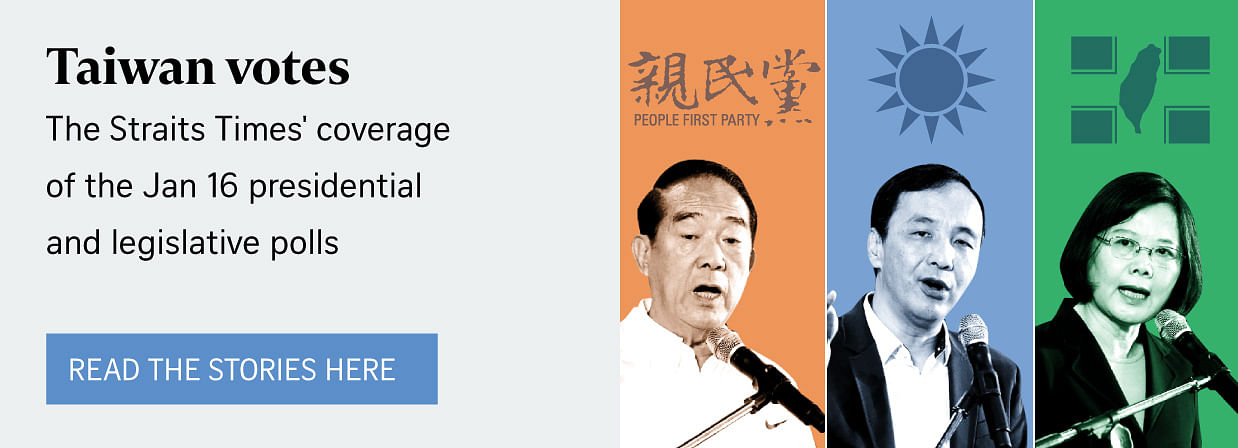Concerns in Taiwan that China may be using economic clout to influence polls
Sign up now: Get ST's newsletters delivered to your inbox
Follow topic:
TAIPEI (REUTERS) - In the weeks ahead of Taiwan's elections, state-linked Chinese firms launched a US$3 billion (S$4.3 billion) cross-strait investment grab, sparking fears that Beijing was using economic clout to influence the island as it looks to vote in an independence-leaning president.
Mainland companies have a brief window to get deals approved before a change of leadership present more hurdles, particularly if anti-Beijing sentiment flavours policy debates both before and after the polls in proudly-democratic Taiwan.
The island votes in a new president and parliament on Jan 16, when the China-friendly ruling Kuomintang (KMT) Party is expected to be defeated by the Democratic Progressive Party (DPP).
State-backed Chinese technology conglomerate Tsinghua Unigroup Ltd is seeking to buy stakes in three Taiwanese chip packaging firms for US$2.6 billion. Some of the investments could get the regulator's sign-off before a new government is inaugurated on May 20.
Tsinghua Unigroup's plans have raised questions among voters over China's economic agenda and the dangers of a monopoly.
"China is switching to an aggressive attitude toward Taiwan from previous elections," said Mr Emile Chang, executive secretary of Taiwan's Investment Commission, noting that companies normally hold off on investments ahead of elections. "It's aiming for economic ties to remain on track."
The Ministry of Economic Affair's investment agency vets proposals on China and other foreign investments and usually announces a decision in two to three months. Approved investments cannot be challenged.
Tsinghua's investments, along with others connected to families of China's People's Liberation Army, have put the spotlight on the uneasy relationship between Taipei and Beijing.
China regards Taiwan as a renegade province to be unified with the mainland, by force if necessary, while Taiwan insists on its rights to be a self-governing entity.
MOOD CHANGE
Ties between China and Taiwan warmed under the government of President Ma Ying-jeou who took office in 2008. The years of engagement, however, have not stopped jobs and manufacturing migrating abroad nor bolstered the economy from recession. Taiwan has only become more dependent on the mainland.
"Unigroup is backed by the China government. They are acquiring Taiwan's key companies, generating negative perceptions among Taiwanese people," said Mr Huang Weiche, a lawmaker of the DPP. "China has said it costs less to absorb Taiwan via economical means than military force. That is what they are doing now."
Tsinghua wants to take a stake of about 25 percent in each of three chip testing and packaging firms: ChipMOS Technologies Inc, Siliconware Precision Industries Co Ltd and Powertech Technology Inc.
US film maker Dan Mintz has also agreed to acquire Taiwan's Eastern Broadcasting Corp (EBC) in a deal valued at US$600 million. Mintz is a co-founder of Shenzhen-listed DMG Entertainment and Media Co ; another co-founder Peter Xiao has links with the PLA .
Beijing is closely watching the outcome of the elections. A win by the DPP's candidate Tsai Ing-wen, the front-runner in the polls, could see Chinese investments coming under more scrutiny in future.
Ms Tsai has said she sees Tsinghua's investments as a "huge threat" to Taiwan's semiconductor industry, concerned that a transfer of technological know-how will hurt domestic industries. Taiwan is home to the world's biggest contract chip manufacturer who supports global brands such as Apple Inc..
Some industry leaders say tie-ups will help both sides: Taiwan's tech exporters could scale up and stay relevant while Chinese firms could quickly acquire expertise.
"Where is Taiwan's future? China has set two goals for its economic development - overseas investment and technology development, and Taiwan should grab this opportunity," Tsinghua Unigroup chairman Zhao Weiguo said in a recent interview.
Since 2009, Taiwan has approved far fewer investments by China than the other way around.
Some 745 Chinese investments worth US$1.33 billion have been approved as of October - less than one per cent of Taiwanese investments in China, said Mr Lee Rongmin, director general of the China Chamber of Commerce for Import and Export of Machinery and Electronics Products in Taipei.
"We're sorry that Tsinghua's planned investments have been seen as a threat of being taken over, creating a barrier for cooperation across the Taiwan Strait," he said.


